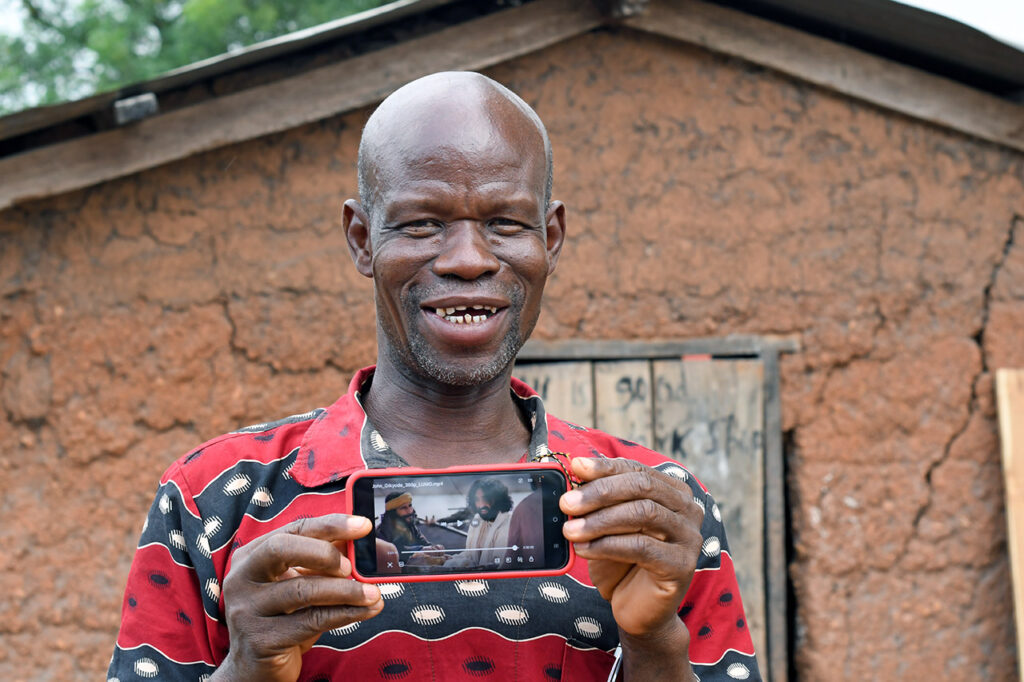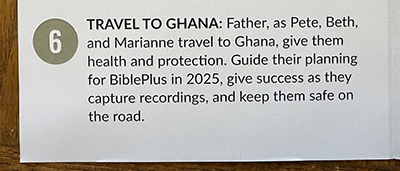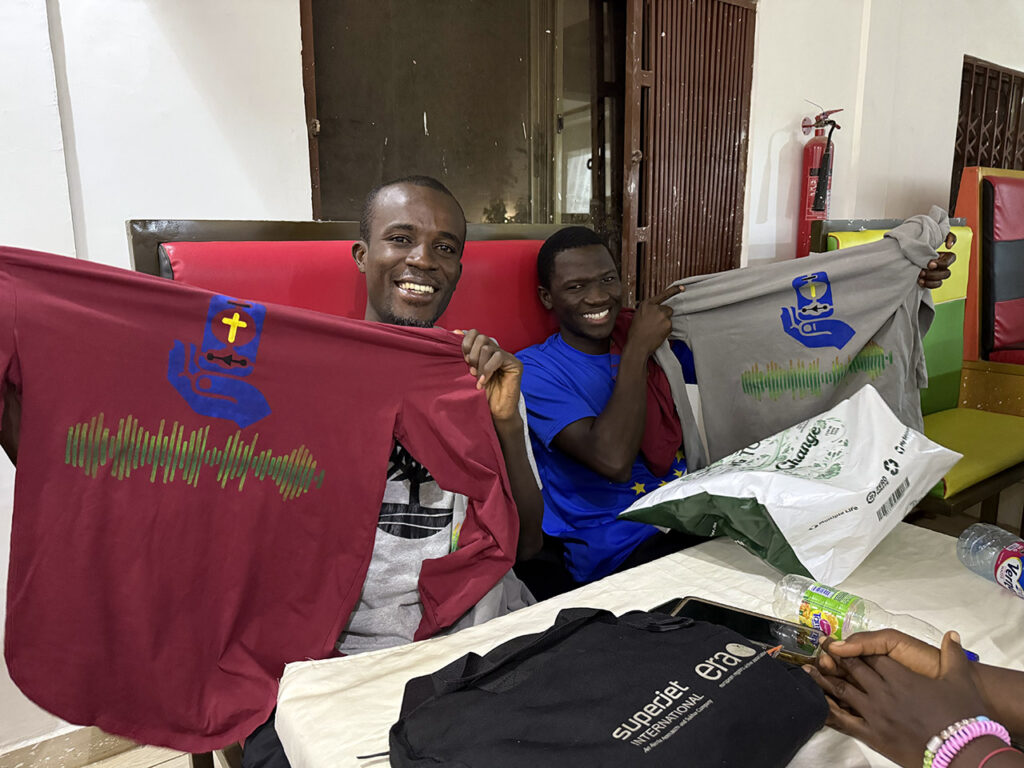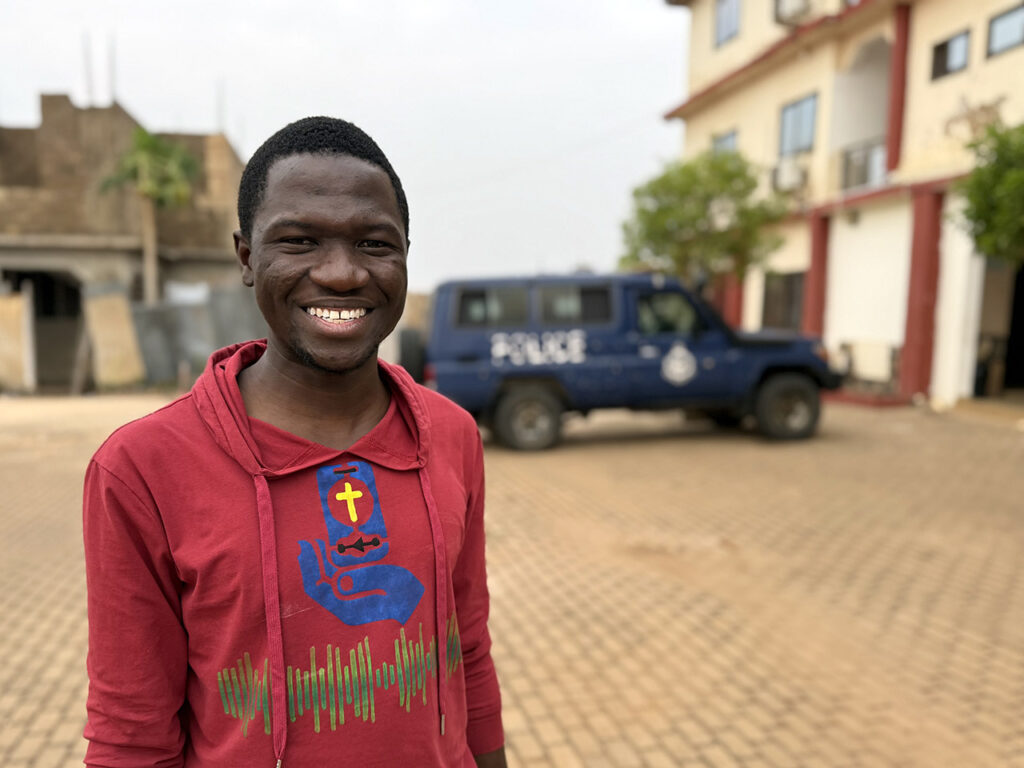
As a child growing up in Shiare, a village perched on the slopes of a mountain, he was known as Kojo, a nickname given to boys born on Monday. A small Catholic school, nestled among the hand-built homes, provided Kojo with his only opportunity for structured education. Yet among the Akyode, educated children were ostracized and forbidden from participating in the sacrifices and idol rituals central to their ancestral beliefs. In 1979, two courageous women from Wycliffe, Linda and Natalie, moved to Shiare to learn Gikyode, the language of the Akyode. Kojo, who had decided to follow Jesus several years earlier, had chosen a new name: Augustine. The bright, inquisitive eleven-year-old was eager to understand why Linda and Natalie had come to his village—a place without electricity, a road, and occasionally unwelcoming to outsiders.
Gikyode was an oral language with no alphabet or written form. As trained linguists, the women first needed to develop a phoneme inventory—a systematic catalog of the sounds used in the language. Achieving fluency in Gikyode required complete immersion in the daily life and culture of the Akyode people. Only then could they carefully select an alphabet that would capture the richness, uniqueness, and remarkable character of a language spoken by just 18,000 people.
Augustine eagerly offered to help as the two women developed “primers” to teach the newly written language to schoolchildren. An alphabet without readers is like a carefully prepared banquet without guests. Everyone was invited to learn, refine, and improve the orthography—the set of conventions governing how the language was divided into words, spelled, and punctuated.
Augustine was captivated by the work, and when the 14-year-old left the village for secondary school, his passion for language deepened. By 1991—twelve years after the women had arrived in Shiare to learn the language and share life with its hardworking people—Augustine began returning home during school breaks to help translate the Bible into Gikyode. Before long, he was taking Bible translation courses in Tamale and working on translating the Gospel of Matthew as part of the Ghana Institute of Linguistics, Literacy, and Bible Translation (GILLBT) team.
After the Gikyode New Testament was completed in 2000, Theovision, a Ghanaian mission group with expertise in audio recording, arrived to produce an audio version. Augustine and the other translators eagerly participated, lending their voices to the very verses they had painstakingly translated into their mother tongue. By 2005, the audio version of the Gikyode New Testament was freely accessible on the Internet, making the scriptures available to an even wider audience.
I listened to Augustine’s rich baritone voice and watched the warmth of his humble smile as he shared his story with me, while the shade of the tree above offered us refuge from the heat.
To understand why I was sitting under a tree asking Augustine about his life, we need to flash back to a few days earlier, when our entire team was in a remote village—a three-hour hike from the nearest road (see Climbing to a Remote Village).
Beth had forged a partnership with Lumo years ago, and a few months before our departure to Ghana, she requested the Gospel of John video in Gikyode. Lumo provided a link for Beth to download each of the 21 chapters. Using ffmpeg, I concatenated and re-encoded all the videos into a single movie file that could be stored on a USB stick and carried to remote villages. The Lumo videos pair narrated audio from the Bible with beautifully filmed video of actors portraying the events described in the text. You can watch the Lumo Gospel of John (in English) on YouTube.
As night fell over the remote mountaintop village, Clement set up to show the Lumo Gospel of John from the USB stick Beth and I had prepared back in Naperville. But as the video began, the gathered children exchanged puzzled glances, and the adults shook their heads. No one could understand the audio. “That is not our language,” someone told Clement.
There we stood in the darkness, holding a USB stick with the wrong language. Around 80 to 90 people stared at us, shifting restlessly as we scrambled for ideas and next steps. Finally, Clement realized the Twi version on the USB stick could be used, and started the movie. Twi, the most widely spoken indigenous language in Ghana, was familiar to most of the teens and adults—at least enough for them to catch some of the meaning. Still… we were disappointed.
The following day, after a three-hour hike back to Nkwanta, we discovered that the Lumo video we thought was in Gikyode was actually for a language spoken 900 miles away in Cameroon. Lumo quickly provided a new download link, and from a blue plastic chair pulled into the shade of a tree, I began downloading the Gospel of John over a mobile phone network.
After downloading a few chapters to my laptop, I walked into the church where Cyrus was recording audio and asked Augustine to step outside and help me. I chose Augustine because he spoke excellent English and, as a native Akyode, he could confirm whether the videos I had just downloaded were indeed in Gikyode.
Augustine followed me as I escaped the bright sun and settled once again under the tree. As I fumbled with my laptop, I explained to Augustine, who had never heard of the Lumo videos, how they combined recorded audio of the Bible with their own video footage to create films.
The critical moment had arrived. With just a few clicks, I would know. I started the video and asked Augustine if the language he heard was Gikyode.
Augustine watched intently with a sublime expression. Slowly, he began to smile. Yet he was holding back, he was still listening.
“That’s my voice!”
“That’s my voice!”,
he said again, now beaming.
We were listening to the Lumo video, which included the audio recorded by Theovision. Augustine was listening to audio of his voice recorded 20 years earlier.
He had just learned that his voice had become the sound track for a gorgeous three hour video.
We both sat, stunned, smiling, and nearly speechless.
A circle, 46 years in the making, had just been completed.
• 1979: Wycliffe translators Linda and Natalie arrived in Shiare to learn Gikyode and begin translating the New Testament. They encouraged Augustine’s faith and included him in their work.
• 1994: Augustine graduated from GILLBT and began working on Bible translation.
• 2000: The New Testament in Gikyode was completed.
• 2005: Theovision recorded the audio of Augustine reading the Gospel of John.
• 2015: Lumo releases their first video, the Gospel of John in English, and begins working to produce hundreds more for different languages.
• 2025: OneWay visited the Akyode, recording audio for BiblePlus.
Forty six years later, Augustine exclaims “That’s my voice”.
I’m still in awe.
Augustine told me how he felt watching the video.
“It made me feel as if I’m taking the place of John, who was speaking his original testimony”.
Later this year, the first BiblePlus solar units and microSD cards will make their way toward the Akyode people.
I asked Augustine to describe how combining the audio Bible, videos, choirs, testimonies, and health information would impact their tiny community.
“BiblePlus will let people have the material in their own homes and phones. If you hear a little of the scripture, and little of the music, it will make the day for the person. BiblePlus is going to attract more people to listen to the scripture as well as the music whenever they are relaxing, or in their house, or at night when they are sleepless,” Augustine told me as he continued to smile and share his excitement.
I thanked Augustine one more time for his help, and we hugged. What a gift to be precisely at the place I needed to be to close a loop that started 46 years earlier.
Yet… the entire conversation with Augustine only happened because of a frustrating and embarrassing evening in a tiny village on a distant mountain. Without the accidental loading of the wrong video onto the USB stick, I would never have asked Augustine to watch the video with me — and we both would have missed the chance to share a moment 46 years in the making.
In the photo above, Augustine is holding a mobile phone playing the Lumo video.
Epilogue
Beth and I returned home yesterday. We are safe and cold. I can’t say we miss the 100+ degree weather, but we do miss the hard work and the Ghanaian people.
On our final full day in Ghana, while I was driving with Beth and Cyrus from Nkwanta to Accra, we were involved in a serious car accident. Thankfully, everyone walked away unhurt, including the other driver, though his car was destroyed. After two days and 10 hours at the police station—being interviewed by investigators and returning to the crash site for measurements—the investigation concluded. The other driver has since offered to cover repairs to Ray’s truck—a HUGE relief.
Beth and I are still a bit sore and also black and blue in a few places. In a video call with my mom, she immediately noticed the abrasion and bruise on my cheek. If not for the side air bag, the outcome would have been quite different.
Yet…. Like the situation with Augustine, even these difficult events strengthen our faith. In the hours before our accident, as I zigzagged around pot holes and motos driving south from Nkwanta, Cyrus, Beth, and I were discussing Romans 8:28. It is one of those verses that cuts immediately to the deepest of theology.
We would like to take the opportunity to also thank everyone who was praying for our safety in Ghana. As we departed for this trip, we wondered how we would accomplish our work in a region under curfew because of recent, deadly tribal conflicts. Yet we were shown once again the peace and reassurance that we cannot strive to attain on our own.
This morning, after we opened two weeks of held postal mail, Beth showed the February 2025 Prayer Guide from OneWay.
Yes. Prayer answered.
Postscript
To close the loop on the art project started two weeks ago, enjoy these photos. Yes, I got help from generative AI to inspiration for part of the artwork.
Home. Safe. Blessed. Thankful.
This concludes the blog for this year. Thank you for following along.





Wow, what an amazing story of Augustine! God works little details together in such a beautiful way.
I am so thankful that you were not badly hurt in the accident. I’m sure it was terrifying, and the aftermath exhausting. But God be praised for His protection!
Oh my goodness! What a post! The emotional roller-coaster of reading the ups and downs of your last days in Ghana! SO glad you (and the others) are okay. Our God knows all and hears our prayers – thanking Him for all that He did on this trip.
I loved the story of Augustine and the Lumo video! I think our Great God grins and winks when He does stuff like that.
Did I ever tell you, Pete and Beth, that John and I showed Gabriel and Deborah Mumuga the old Pioneers video from the 70’s called “Ee-taow” when they were visiting the US.? They were so excited and surprised when they recognized a man that they knew from Sugu Valley in some of the scenes that were re-enactments of the Mouk villagers responding to the story of the resurrection of Jesus. Another wink. :)
Wow! Praise God! Glad you are safe and you all walked away from the accident! The story of the 46 year old story was amazing!
Wonderful!
Praise the Lord for His faithfulness to this Lord-loving dynamic duo!!!! Through adversity and the repeated call for perseverance and trust, in you and those like Augustine, Jesus shines brightly!
Grateful to be a witness of your testimony and recipient of your friendship. The Cannons love and admire the work of Christ in you!
Heal well and completely. Thankful you’re home safely.